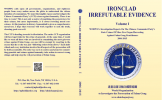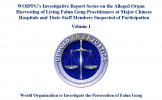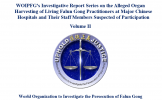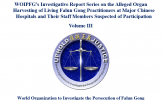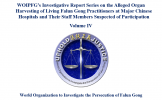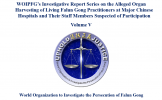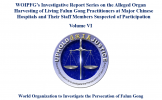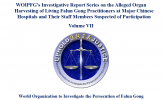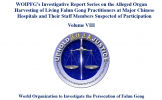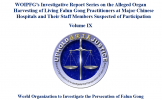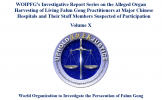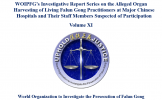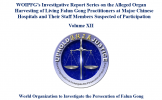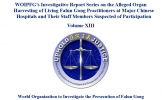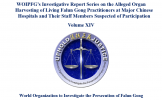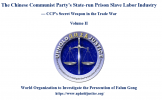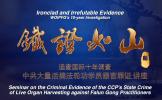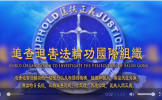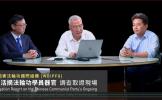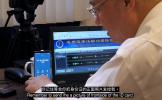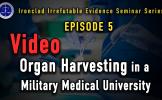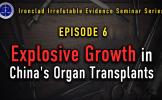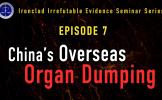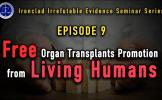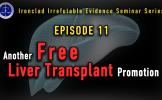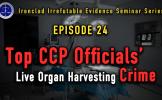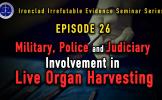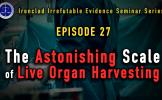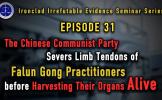WOIPFG’s Investigative Report on Zheng Shusen
Zheng Shusen, president of the First Affiliated Hospital, School of Medicine, Zhejiang University, former chairman of the Chinese Transplant Congress (CTC) and chairman of China Organ Procurement Organization Alliance, was also the chairman (from 2007 to 2017) of the Zhejiang branch of “China Anti-cult Association” (CACA), which is one of the Chinese Communist Party’s (CCP) important agencies against Falun Gong. Zheng Shusen’s academic paper that was retracted by Liver International, his another questionable medical papers and the phone investigation recordings of several doctors from the First Affiliated Hospital of Zhejiang University show that the hospital, of which Zheng Shusen is the president, is an important base for the CCP’s live organ harvesting of Falun Gong practitioners. And Zheng is suspected to be one of the major organizers in the live organ harvesting on an enormous scale and an executor of the persecution against Falun Gong practitioners. Also, evidence suggests that the member hospitals and individuals of the China Organ Procurement Organization Alliance headed by Zheng Shusen are also suspected of participation in the live organ harvesting of Falun Gong practitioners.
I. Zheng Shusen is one of the Provincial-level Officials Responsible for the CCP’s Persecution of Falun Gong
Zheng Shusen was the chairman of the Zhejiang branch of “China Anti-cult Association” from 2007 to 2017, which was established specifically for the purpose of persecuting Falun Gong. The “China Anti-cult Association” is an organization composed of high-level CCP and government officials with religious and scientific expertise. All of the Association’s activities have the Party, the government and its media’s participation, and its members, with their religious and scientific backgrounds, publicly justify the CCP’s persecution against Falun Gong to both domestic and international society, study and implement measures on persecuting Falun Gong for the Chinese regime and concoct anti-Falun Gong theories. Furthermore, CACA has directly taken part in persecuting Falun Gong practitioners including forcing Falun Gong practitioners to give up their religious beliefs.[1]
Established in 2002, the Zhejiang branch of “China Anti-cult Association” is under the direction of the China Anti-cult Association formed in November 2000, and its main activities are to persecute Falun Gong.[2] It claims to be a not-for-profit civil organization, yet it’s completely funded by the Chinese government. According to its official website (http://www.cnqjc.com) and the report by China Anti-cult Association on the work done by its Zhejiang branch, this branch’s activities include: the implementation of the CCP’s guidelines and policies against Falun Gong; carrying out the tasks given by the party and government in Zhejiang Province, including the assignments given by the “610 Office” of Zhejiang Province; the publication of books on theories against Falun Gong; the spreading of rhetoric hostile to Falun Gong through seminars, lectures, the Internet and social media; establishing and reinforcing the organizations against Falun Gong by holding workshops, sponsoring university/college events, and assisting the work of the county-level and municipal “Anti-cult Associations” within its jurisdictions; as well as assisting the “610 Office” in brainwashing Falun Gong practitioners and forcing them to relinquish their faith, by inspecting labor camps and prisons and by actively participating in “conversion” work and “social reintegration projects” targeting Falun Gong practitioners, etc. The majority of those Falun Gong practitioners, who have been persecuted to death, maimed or tortured, are due to their refusal to be “educated and transformed”.[3] The “China Anti-cult Association” not only provides the CCP with theories in support of its suppression of Falun Gong, but also recommends systematic proposals for suppression to the CCP’s political and legal authorities.[4]
Zheng Shusen has personally organized and/or participated in the following activities against Falun Gong:
He attended and spoke at various meetings against Falun Gong. Some officials from the “610 Office” also attended and spoke at those meetings, such as:
In November 2007, he participated in the national annual meeting of “China Anti-cult Association” in Hangzhou, as deputy chairman of the Zhejiang branch of “China Anti-cult Association”.[5]
In December 2009, he made opening remarks at a conference held by a grassroots organization affiliated with the Zhejiang branch of “China Anti-cult Association”, in his capacity of chairman of the Zhejiang branch of “China Anti-cult Association”.[6]
In 2010, he attended and spoke at the opening meeting of a student-cadre training course and the conference in recognition of model cadres sponsored by the “Anti-cult Association of Universities in Zhejiang Province”, as chairman of the Zhejiang branch of “China Anti-cult Association”.[7] The purpose of that training course was to train future mainstay cadres to persecute Falun Gong practitioners.[8]
In 2012, he participated in a joint meeting of secretaries-general of the Zhejiang branch of “China Anti-cult Association” and made a keynote speech at the meeting, in his capacity of chairman of the Zhejiang branch of “China Anti-cult Association”.[9]
On January 17, 2013, his work report was presented on his behalf by Zhao Yue, deputy chairman of the Zhejiang branch of “China Anti-cult Association”, at the11th meeting of the second session of the Zhejiang branch held in Hangzhou.[10]
Zheng Shusen is responsible for researching and publishing materials against Falun Gong:
Zheng Shusen heads the board of editors of a book titled “Studies on the Prevention and Remedy of Evil Cults in the New Era -- A Collection of Selected Academic Papers”, which was published by China Science and Technology Publishing House in 2009.[11]
Zheng Shusen provides reports and/or suggestions to the authorities for the suppression of Falun Gong
The work assignments of the Zhejiang branch of “China Anti-cult Association” include “keeping a close watch on evil cults’ activities and their developments in society, and submitting reports and/or suggestions to relevant government agencies.”[12]
II. Zheng Shusen’s Paper Retracted by Liver International Shows Evidence of Live Organ Harvesting
Why was Zheng’s paper retracted?
In August 2016, the 26th International Congress of The Transplantation Society was held in Hong Kong. The New York Times reported, “at the news conference on Friday, Dr. Jeremy Chapman, a former president of the society, said that a paper delivered at the Thursday meeting may have violated the society’s rules that no organs from executed prisoners be used in research. Dr. Chapman did not name the presenter, but several people who attended identified him as Dr. Zheng, the transplant surgeon at Zhejiang University.”[13]
Dr. Chapman said that TTS had told the Chinese government to investigate the matter and that TTS would also conduct its own investigation. If the suspicions proved true, Dr. Chapman said, “Then they will be named and shamed, and they will be excluded from our meetings forever — and from publication in transplantation journals.”[14]
The academic paper that Zheng submitted to TTS was not his only medical paper, which got him into trouble. Half a year later, Zheng’s another paper was retracted by Liver International.
On February 6, 2017, an article published on Science magazine’s website read, “On January 30, 2017, clinical ethicist Wendy Rogers of Macquarie University in Sydney, Australia, and her colleagues wrote a letter to the editor of Liver International, calling for the retraction of one of Zheng’s medical papers, which was published on this magazine’s website in October 2016, due to ‘absence of credible evidence of ethical sourcing of organs’.”[15]
Liver International is the official journal of the International Association for the Study of the Liver. Upon receiving the letter, the editor-in-chief of Liver International asked two of the paper’s authors, Zheng Shusen and Yan Sheng, for credible evidence on the organ sources. However, they hadn’t responded, when the deadline of February 3, 2017 passed. As the magazine’s editor was concerned that the paper’s “data on the safety of liver transplantation involved organs sourced from executed prisoners”, he decided to publish the study on a print issue, but with a retraction statement, and to implement a “life-long embargo” on the two authors from submitting their work to Liver International.[16]
What’s behind Zheng’s paper retraction by Liver International?
The retracted paper was titled “Safety limitations of fatty liver transplantation can be extended to 40%: Experience of a single Centre in China”.[17] This paper reads, “546 liver transplantation was performed consecutively at the First Affiliated Hospital, School of Medicine, Zhejiang University from April 2010 to October 2014. One patient was excluded from this study due to loss to follow-up. All organs were procured from donors after cardiac death (DCD) and no allografts obtained from executed prisoners were used.”[18]
Wendy Rogers, a professor of clinical ethics at Macquarie University in Sydney, wrote a protest letter with two other doctors to Liver International, stating thatit was impossible for one hospital to have obtained so many useable livers from cardiac deaths alone during a 4-year period, since there were not so many voluntarily donated organs in China at the time.[19]
In the letter, Rogers wrote, “International programs report relatively low rates of procurement of livers from DCD (Donation after Cardiac Death) donors. In the USA, rates of liver transplant from DCD donors in the years 2012-14 were 32%, 28% and 27% respectively. If retrieval rates are similar in China, this would require 1,880 DCD donors, assuming a retrieval rate of 30%, to transplant the 564 livers reported in this paper”.[20]
“Given that there were only 2,326 reported voluntary donations in the whole of China during 2011–2014, it is implausible that this small pool could have resulted in 564 livers successfully retrieved … unless the surgeons there had exclusive access to at least 80% of all voluntary donors across the whole of China in this period.”[21]
A week after Liver International declared the paper’s retraction, Dr. Jiefu Huang, Chairman of the China Organ Donation and Transplantation Committee, said in an interview with The Paper, a Chinese state-owned digital news outlet, that his committee “supported the magazine’s decision, because Zheng’ s data are inconsistent with the facts”.[22] However, eerily, this article was soon deleted by the CCP government.
WOIPFG has discovered that Huang’s statement in the article was unfounded. In the article, Huang claimed that during the period from 2011 to 2014, there were total 1,910 liver donations in the entire country.[23] 166 of these livers were assigned to Zheng Shusen’s hospital,[24] and that this number was much smaller than the 564 cases mentioned in Zheng’s academic paper. However, the CCP officially claimed that procuring organs from executed prisoners would be banned on January 1, 2015. So, the period from April 2010 to October 2014 was the so-called transition period from using executed prisoners’ organs to using voluntary donors’ organs. That is, organs from sources other than donations were still being used during this time period. Therefore, Huang Jiefu’s explanation of the fabricated data contained in Zheng’s academic paper based on the number of livers assigned to Zheng’s hospital is logically unfounded.
Besides, Huang Jiefu has more motive to fabricate the number than Zheng Shusen. Zheng’s motive is to publish paper. The number of 166 cases of the liver transplants is large enough. Exaggerating the number was not necessary to help the paper being accepted. While Huang Jiefu, as the spokesperson for the “organ transplant reform” in China, faced the international pressure on the accusation of organ harvesting from live Falun Gong practitioners, has strong motive to reduce the number of the transplants performed. He had to use the “mistake” of fake data to cover up the real source of the organs.
In fact, according to other data released by the CCP authorities, the organ transplantation volume was very large in China at that time. And the actual organ transplant volume was increasing and far larger than the 1,910 cases mentioned by Huang Jiefu.[25] This can be proved by the following three pieces of evidence.
According to Huang Jiefu’s own statement to the “Guangzhou Daily” in March 2013, the number of liver transplants carried out by himself in year 2012 alone exceeded 500 cases, among which, only one case was from voluntary donation.[26] Huang was only one of thousands transplant surgeons in China at that time.
During approximately the same time period, according to the calculations based on the occupancy rate of organ transplant ward beds and the number of beds, the number of organ transplants at the organ transplant center of the Tianjin First Central Hospital, whose main business operations involve liver transplantation, soared to as high as approximately 8,000 cases per year. This upward trend was very similar to the trend implied by Huang Jiefu’s claim that he performed more than 500 cases of liver transplants in one year, due to a rapid increase in organ transplant volume. According to the hospital itself, “In 2013, different divisions at our hospital all made progress, to a greater or lesser extent…The occupancy rate of hospital beds increased by 5.7%, when compared with the same period in 2012, to become 131.1%. So, the hospital added 300 more beds to the (currently existing) 1,200 beds, to achieve 1,500 beds; and the organ transplant center also had an increase in ward beds.”[27] Previously, the organ transplant center’s new building was put in use on September 1, 2006, with over 500 beds, and its focus was on developing liver and kidney transplantation.[28] (Another official media outlet reported that the number of ward beds for organ transplantation had already reached over 700 by this time.[29])
It can be seen that the ward beds’ occupancy rate in the organ transplant center had always been increasing, exceeding the average bed occupancy rate of the entire hospital. And the average length of hospitalization for liver transplant in this hospital was 25-30 days[30]. The average length for kidney transplantation was also within 30 days. Therefore, by calculating with a hospitalization length of 30 days per person for all liver and kidney transplant patients, a conservative estimation would show that if all the patients discharged from this organ transplant center were liver and kidney transplant patients, the number of discharged patients could reach up to 7,975 (=500×365×131.1%/30).
During the same period, according to the data from the People’s Liberation Army No. 309 Hospital, the number of organ transplants at this hospital continued to increase substantially, and far exceeded the number of possible organ donations this hospital could receive. The gross revenue from medical treatments of the organ transplant center at this hospital increased from 30 million yuan in 2006 to 230 million yuan in 2010, a nearly 8-fold increase in five years.[31]According to the hospital’s website, in 2010, the hospital’s organ transplant center had 316 beds”,[32] and “the annual hospitalization capacity and the number of bed turnovers are in leading positions among the military’s similar disciplines”[33].
In 2012, the Xinhua News Agency reported that there were “393 beds” in the organ transplant center of this hospital.[34]
Based on the conservative assumption that the bed occupancy rate is 100% (This is considered conservative, because the average bed occupancy rate of the Chinese Class A tertiary hospitals during the same period was 103%[35]), the calculations below show the estimated number of organ transplants in this hospital.
The number of liver and kidney transplants in 2010 would be 3,844 (=316*365*100%/30) cases;
the number of liver and kidney transplants in 2012 would be 4,781 (=393*365*100%/30) cases
The Tianjin First Central Hospital’s Orient Organ Transplant Center and the PLA No. 309 Hospital are only two of the 169 organ transplant hospitals in China. Yet, the combined volume of their organ transplants in one year already exceeded the total annual number of organ transplants claimed by the CCP for the entire country (10,000 cases).
III. Exposed Evidence of Live Organ Harvesting from Zheng Shusen’s Medical Paper on Emergency Transplantation
Zheng Shusen’s research paper published in 2005 shows that the First Affiliated Hospital of Zhejiang University School of Medicine performed 46 emergency liver transplant operations from January 2000 to December 2004.[36] Although the number of transplants mentioned in this paper seems relatively small, from the medical point of view, this is precisely an important piece of evidence to show that this hospital, where Zheng works, is suspected of participating in live organ harvesting from Falun gong practitioners. The reason is as follows:
An emergency liver transplant is an urgent liver transplant operation performed on patients with acute, serious liver problems and less than 72 hours to live. Due to the difficulty of urgent tissue typing, long waiting times, emergency liver transplants are rarely seen in other countries.
Zhejiang Province didn’t participate in the organ donation pilot project, until August 26, 2010.[37] So, it is obvious that these 46 organs could not have come from voluntary organ donations.
These 46 organs could not have come from executed prisoners, either. The CCP’s organ resources from executed prisoners are scarce. So, each hospital would have its own several fixed prisons supplying organs from executed prisoners, based on the hospital’s location. Therefore, it is unlikely for a hospital to obtain organs from the prisons in other locations as the regular source. Furthermore, the organs need to be matched. On the one hand, executions take place according to their scheduled times and places, and it is almost impossible to satisfy the needs of emergency liver transplants. On the other hand, China had no national organ distribution network at that time. Under such circumstances, it is virtually impossible for the First Affiliated Hospital of Zhejiang University to procure a matching liver from a couple of prisons, which cooperate with it, within 72 hours. However, Zheng Shusen performed 46 cases of emergency liver transplantation during a 4-year period. Where did these donors come from?
In China, in addition to the First Affiliated Hospital of Zhejiang University, other hospitals, which carry out a large number of emergency liver transplants, are commonplace. According to data from The 2006 Annual Report on China Liver Transplant Registration[38], 8,486 cases of liver transplantation were performed in 29 organ transplant centers from April 6, 2005, to December 31, 2006. Out of these, 4,331 cases had specified whether or not they were emergency transplants, indicating a total of 1,150 emergency liver transplants performed, or 26.6% of the total number of indicated cases. In one case, the patient received a liver transplant operation only four hours after being hospitalized.[39]According to Huang Jiefu’s report, as of year 2006, China had carried out 10,502 cases of liver transplantation.[40] The actual number of emergency liver transplants should be even larger.[41]
Executions of death row prisoners have to go through a rigorous judicial process. So, it is impossible for executed prisoners to satisfy the need of such a large number of emergency organ transplants. Therefore, the donor sources could not have been executed prisoners.
In order to complete a large number of emergency organ transplants, it requires an enormous group of people, who exist independently from death-row prisoners, whose organs have been matched prior to the transplant operations, who have lost their freedom and can be killed on demand for organ transplants. That is, a living donor bank is needed. In China, only the large number of Falun Gong practitioners, who are being illegally detained by the CCP and have been forced to take blood tests on a massive scale, meet such requirements.
At that time, China did not have a unified organ distribution system. China Organ Transplant Response System (COTRS) started its online trial operation in 2011. In August 2013, the National Health and Family Planning Commission of the Chinese Communist Party promulgated the “Administrative Regulations on the Procurement and Distribution of Human Donor Organs (Trial)”, only after that the status of COTRS as a mandatory national system was clarified.[42]
The evidence above proves that the CCP has a large living organ donor bank, which is independent from the death-row prison system, and the individuals inside this organ donor bank have already taken blood tests previously to determine their HLA types. And they can be slaughtered at any time according to the need for organ transplant operations.
IV. More Evidence of Live Organ Harvesting of Falun Gong Practitioners in the hospitals, where Zheng Shusen Works
The First Affiliated Hospital of Zhejiang University is also the home of a key laboratory for the studies and research on the topic of joint multiple-organ transplant – a research project of the Ministry of Health. The laboratory was founded in March 2011, and it is the largest transplant center in East China and has become one of the largest organ transplant centers in China.[43] In addition, Zheng Shusen has also founded a private hospital, which is called Zhejiang University International Hospital (aka Shulan Hospital), and the abundant supply of organs as well as the short organ wait times at this hospital cannot be explained by organ donations alone, the same as in the case of the First Affiliated Hospital of Zhejiang University.
According to WOIPFG’s investigation, the First Affiliated Hospital of Zhejiang University is one of the most significant bases in harvesting living Falun Gong practitioners’ organs.
One nurse of the hospital once said, “Our hospital does several thousand cases every year”, and there were “living donors”. [44]
WOIPFG’s phone investigation recording:
Investigative subject: Liver transplant ward at the First Affiliated Hospital of Zhejiang University
Date: May 4, 2016
Phone number: +86-57187236736
(Recording: MP3)
Nurse on duty: “Our hospital performs several thousand cases every year. Zheng Shusen is our chief physician. We even had living donors.” When asked by the investigator whether or not they could use organs from “living donors”, the doctor told the investigator to hurry up and register at the outpatient service.
In addition, WOIPFG’s investigation on Zheng Shusen’s private hospital, Zhejiang University International Hospital, shows that it has abundant donor livers, which could be obtained in a very short period of time. And emergency organ transplant patients can “begin the surgery immediately”, while regular patients would “receive information on liver sources on the next day”. This cannot be explained by organ donations or organs from executed prisoners, and it only proves that this hospital has an independent and massive living donor bank. Please take a look at the following phone investigation recordings:
Investigative subject: Dr. Liang Jianzhong of Liver Transplant Department at Zhejiang University International Hospital
Date: July 25, 2016
Phone number: +86+ 13516703061
(Recording: MP3 & Addendum)
Doctor: “If it’s really urgent, we can certainly do the surgery immediately.” “Liver transplantation is [our] preponderant discipline.” “Every day, we do 2-3 cases [of liver transplant surgeries].” “The liver sources are relatively easy to find.”
Investigative subject: Xie Qinfen, Organ Procurement Coordinator for Liver Transplantation at Zhejiang University International Hospital
Date: February 28, 2017
Phone number: +86+13968153957
(Recording: MP3 & Addendum 8)
Xie Qinfen: “Generally speaking, it may take about two weeks [to get the liver]. Sometimes it’s very fast. Sometimes people can even do it on the second day. It depends on your situation. Critically ill patients can take the priority.” “We did over 120 cases last year, which was our first year.” “We would usually receive information on donor livers on the second day, [after we make an inquiry].” “Liver procurement mainly depends on President Zheng. He has established a reputation and has lots of connections on various aspects.”
V. Zheng Shusen’s Real Face as Chairman of China Organ Procurement Organization Alliance
Zheng has also been the chairman of China Organ Procurement Organization (OPO) Alliance since its establishment on November 23, 2014.[45] Huang Jiefu is this alliance’s honorary chairman.[46] This alliance has been the most significant component of China’s state-run organ donation system since the authorities declared the abolishment of the use of organs from executed prisoners for transplants on January 1, 2015. Its major responsibilities include persuading people to donate their organs, storing organs, inputting data, and assigning, harvesting, transporting and transplanting organs, as well as providing patients with post-operative care.[47]
According to WOIPFG’s investigation, the member hospitals of the OPO Alliance are also allegedly involved in the live organ harvesting of Falun Gong practitioners, and in the trafficking of other individuals’ organs.[48] The major pieces of evidence include:
Zhu Yunsong, director of the Department of Urology at the General Hospital of Guangzhou Military Command of PLA, which is the first member of China Organ Procurement Organization (OPO) Alliance, has acknowledged the use of Falun Gong practitioners’ organs in transplant surgeries.[49]
The three chairmen of the alliance, including Huang Jiefu, have been accused of having participated in the live organ harvesting of Falun Gong practitioners. [50]
20 member hospitals of this alliance acknowledged during WOIPFG’s phone investigations that they had performed live organ harvesting on Falun Gong practitioners. [51]
A number of this alliance’s member hospitals have participated in trafficking human organs. According to reports by the CCP’s official media outlets, the General Hospital of Guangzhou Military Command of PLA has been involved in illegal organ trafficking,[52] the PLA No. 304 hospital has participated in organ trafficking from 2010 to 2012,[53] and the Third Affiliated Hospital of Sun Yat-sen University has even participated in the crime of murdering a homeless man to steal his organs.[54]
Three major central-government directly controlled municipalities, including Beijing, Shanghai and Tianjin, have the largest numbers of organ transplant hospitals and the largest numbers of organ transplants in China, but their numbers of donated organs are extremely limited. In December 2015, when the CCP announced that all the organs used in transplant surgeries came from donations, Beijing, which had as many as 20 large-scale organ transplant hospitals, hadn’t even established one organ donation office.
a. The staff of the Red Cross Society of Beijing said that the Red Cross Society was only making preparations, as organ donation had not yet begun (December 6, 2015, Phone Number: +8610-6355-8766, Download: MP3 & Script)
b. Tianjin Red Cross staff said that there had been only over 170 cases of organ donation since the organ donation bank was established in 2003 (December 11, 2015, Phone Number: +8622-2731-1180, Download: MP3 & Script)
c. The entire city of Shanghai only has 5 successful cases of organ donation (December 17, 2015, Phone Number: +8621-6336-5880) Red Cross organ donation office staff in Huangpu District, Shanghai said that they had only begun this work since the first half of 2014. The higher level had issued a document, and (receiving) donated organs was very difficult. As of December 12, 2015, there had only been five cases of organ donations in Shanghai. (Download: MP3 & Script)
Conclusion
Zheng Shusen is one of the principal doctors, who have participated in the live organ harvesting of Falun Gong practitioners in China. He is also one of the main organizers of live organ harvesting of Falun Gong practitioners in China, and this is closely related to his leadership position in an organization, which has played a significant role in the persecution of Falun Gong.
Reference:
[1]“Regulations of Anti-cult Associations of China”https://web.archive.org/web/20180612182003/http://pds.weidong.gov.cn/qu…
[2]WOIPFG. “Investigative Report of the Chinese Anti-Cult Association's Role in the Persecution of Falun Gong”. March 23, 2004. http://www.upholdjustice.org/node/85
[3]WOIPFG. “The Destruction of Mind and Body Through Brainwashing”. April 28, 2004.http://www.upholdjustice.org/node/60
WOIPFG. “Investigative Report on Brainwashing Classes and Brainwashing Methods”. October 9, 2004. http://www.upholdjustice.org/node/136
[4]WOIPFG. “Investigative Report of the Chinese Anti-Cult Association's Role in the Persecution of Falun Gong”. March 23, 2004. http://www.upholdjustice.org/node/85
[5]Jiangxi Association for Science and Technology. “2007 Annual Meeting of China Anti-cult Association sponsored by China Anti-cult Association and organized by Zhejiang Anti-cult Association was held in Hangzhou from November 22 to 26, 2007. Zheng Shusen, vice chairman of the Zhejiang Anti-cult Association and academician of the Chinese Academy of Engineering, attended the annual meeting.”
Original report: http://www.jxkx.gov.cn/san.asp?id=3486
Archived webpage: https://web.archive.org/web/20180608013729/http://www.jxkx.gov.cn/san.a…
[6]Hangzhou Daily. December 10, 2009. A grassroot unit on-site meeting sponsored by Zhejiang Anti-cult Association, organized by Hangzhou Anti-cult Association and Xihu District Anti-cult Association, was held in our city from December 9 to 10. Wang Huizhong, Member of the Standing Committee of the Provincial Party Committee and Secretary of the Provincial Party Committee’s Political and Legal Affairs Commission, Zheng Shusen, Chairman of the Zhejiang Anti-cult Association and academician of the Chinese Academy of Engineering, and Ye Ming, deputy secretary of the Hangzhou Municipal Party Committee and secretary of the Municipal Party Committee’s Political and Legal Affairs Commission made speeches at the opening ceremony respectively.” http://andong.zj.com/show/id/12396/db/
[7]Zhejiang University of Science and Technology. October 23, 2010. “Representatives of the school’s Anti-cult Association participated in the opening ceremony of a training course for student cadres of college anti-cult associations in the province and recognition conference of advanced (individuals and organizations). The leaders attending this conference included Academician Zheng Shusen, Chairman of Zhejiang Anti-cult Association, Li Anping, Deputy Secretary General of the China Anti-cult Association, Director Lou Zhilang of the Zhejiang Provincial 610 Office, and Lu Shanzeng, Party Secretary of the Zhejiang Provincial Association for Science and Technology, and student cadres of anti-cult associations from over 80 universities and colleges across the province. At 8:30, the opening ceremony officially began. Academician Zheng Shusen, chairman of the Zhejiang Anti-cult Association, delivered a speech first. Academician Zheng fully affirmed the efforts of the anti-cult associations in various universities and colleges and expressed his earnest hopes for the students.” http://sunshine.zstu.edu.cn/v6/?mid=zixun_campusnews&page=82&document_s…
[8]“The 4th University Student Anti-cult Association Student Cadre Training Class and Commendation Meeting was Held in Hangzhou.” October 23, 2010. The meeting had also invited Comrade Li Anping, Deputy Secretary-General of China Anti-cult Association, Zhu Hengyi, Deputy Director of Provincial Party Committee’s 610 Office, and Mo Xingfu, Director of National and Religious Affairs Committee gave special reports to student cadres, focusing on the current situation and tasks of fighting “cult organizations” such as Falun Gong, and interacted with the students. http://www.hzsqsqsq.com/show_hdr.php?xname=6M3A461&dname=B3ITG61&xpos=0
Archived webpage: http://archive.is/jMqUV
[9]Xihu District Science and Technology Association of Hangzhou. April 16-17, 2012. “A joint meeting of the Secretary Generals of the Anti-cult Association was held in Zhejiang Province, Cheng Ningning, Deputy Secretary-General of the Chinese Anti-cult Association attended the meeting and made a special report on the international civil anti-cult information exchange; Academician Zheng Shusen, chairman of the Provincial Anti-cult Association, made a speech; and Zhu Hengyi, deputy director of the Provincial Party Committee’s Preventive Office made a special report on the current situation and efforts. The meeting first reviewed the achievements made by the anti-cult organizations in the province in the past year, and studied and deployed assignments to further promote the anti-cult education and prevention and control.” http://www.hzxhkx.com/worknews.asp?id=214
[10]Qianjiang Tide. “The 11th meeting of the second session of Zhejiang Anti-cult Association and a forum for people from all walks of life was successfully held”. January 28, 2013.http://www.cnqjc.com/cnqjc/xhdt/2013/0123/6787.html
[11]Hangzhou Municipal Science Writers Association. The key anti-cult topic in Hangzhou “A Discussion on The Social Foundational Relationship Between Building A Healthy and Harmonious Society And Modern Cultists” thesis was compiled by the Editorial Board of “Studies on the Prevention and Remedy of the Evil Cult in the New Era - The Selection Of Academic Papers” in which Zheng Shusen, a member of the Chinese Academy of Engineering, was the chairman and director of the Zhejiang Anti-cult Association. Published by China Science and Technology Press in 2009.
http://www.hkx.org.cn/xhjj/index.asp?id=39
Archived webpage: https://web.archive.org/web/20180612181631/http://www.hkx.org.cn/xhjj/index.asp?id=39
[12]“A Subsidiary of Zhejiang Provincial Association for Science and Technology 2016.”
WOIPFG archived webpage: https://web.archive.org/web/20180612182732/http://www.kcfxj.org/cn/more…
[13]Tatlow, Didi Kirsten. “Chinese Claim That World Accepts Its Organ Transplant System Is Rebutted”. The New York Times. August 19, 2016. https://www.nytimes.com/2016/08/20/world/asia/china-hong-kong-organ-tra…
[14]Tatlow, Didi Kirsten. “Chinese Claim That World Accepts Its Organ Transplant System Is Rebutted”. The New York Times. August 19, 2016. https://www.nytimes.com/2016/08/20/world/asia/china-hong-kong-organ-tra…
[15]Chawla, Dalmeet Singh. “Study retraction reignites concern over China’s possible use of prisoner organs”. Science. February 6, 2017.http://www.sciencemag.org/news/2017/02/study-retraction-reignites-concern-over-china-s-possible-use-prisoner-organs
[16]Chawla, Dalmeet Singh. “Study retraction reignites concern over China’s possible use of prisoner organs”. Science. February 6, 2017.http://www.sciencemag.org/news/2017/02/study-retraction-reignites-concern-over-china-s-possible-use-prisoner-organs
[17]Retracted Article: “Safety limitations of fatty liver transplantation can be extended to 40%: Experience of a single centre in China”. Article originally received by: Liver International, Wiley Online,https://onlinelibrary.wiley.com/doi/pdf/10.1111/liv.13244
[18]Retracted Article: “Safety limitations of fatty liver transplantation can be extended to 40%: Experience of a single centre in China”. Article originally received by: Liver International, Wiley Online, https://onlinelibrary.wiley.com/doi/pdf/10.1111/liv.13244
[19]Davey, Melissa. “Medical journal to retract paper after concerns organs came from executed prisoners.” The Guardian. February 8, 2017. https://www.theguardian.com/world/2017/feb/09/medical-journal-to-retract-paper-over-concerns-organs-came-from-executed-prisoners
[20]Davey, Melissa. “Medical journal to retract paper after concerns organs came from executed prisoners.” The Guardian. February 8, 2017.https://www.theguardian.com/world/2017/feb/09/medical-journal-to-retract-paper-over-concerns-organs-came-from-executed-prisoners
[21]Davey, Melissa. “Medical journal to retract paper after concerns organs came from executed prisoners.” The Guardian. February 8, 2017.https://www.theguardian.com/world/2017/feb/09/medical-journal-to-retract-paper-over-concerns-organs-came-from-executed-prisoners
[22]Wang, Yingying. “Jiefu Huang Talks About an Academician’s Medical Paper Being Retracted due to Organ Source Suspicions: Seeking Truth from the Facts and Promoting Transplantation According to the Law”. The Paper. February 12, 2017. Archived webpage link: https://archive.is/QKQxf
[23]Wang, Yingying. “Jiefu Huang Talks About an Academician’s Medical Paper Being Retracted due to Organ Source Suspicions: Seeking Truth from the Facts and Promoting Transplantation According to the Law”. The Paper. February 12, 2017. Archived webpage link: https://archive.is/QKQxf
[24]Wang, Yingying. “Jiefu Huang Talks About an Academician’s Medical Paper Being Retracted due to Organ Source Suspicions: Seeking Truth from the Facts and Promoting Transplantation According to the Law”. The Paper. February 12, 2017. Archived webpage link: https://archive.is/QKQxf
[25]Robertson, Matthew and Jacob Lavee. “China’s Organ Transplant Problem”. The Diplomat. March 29, 2017. https://thediplomat.com/2017/03/chinas-organ-transplant-problem/
[26]WOIFPG “Introduction to the Investigative List of the CCP Organizations and Individuals Responsible for Live Organ Harvesting Falun Gong Practitioners”.https://www.zhuichaguoji.org/node/45008
[27]Qu Lulin. (2014, June 25). Tianjin First Central Hospital. Retrieved from http://www.sjtu.edu.cn/zdh/zzjg/fsyy.htm
WOIPFG Archived Link:http://www.zhuichaguoji.org/cn/images/nationalcriminalreports/497.png
[28]Oriental Organ Transplant Center launched yesterday. (2006, Sep. 02). Sohu News. Retrieved from http://news.sohu.com/20060902/n245125745.shtml
WOIPFG Archived Link: http://www.zhuichaguoji.org/cn/images/nationalcriminalreports/503.png
[29]“He strived for excellence in the past and is achieving greatness today – famous transplant expertProfessor Shen Zhongyang.” Famous Doctors in Tianjin.https://web.archive.org/web/20171210202329/http://www.cccm-em120.com/zh…
[30]“To explore the effective methods and ways of myocardial protection, a research topic of the department of anesthesiology was approved, revealing the mechanism of myocardial damage during liver transplantation’s perioperative period”. Tianjin First Central Hospital http://www.tj-fch.com/sitecn/magazineInfo.aspx?id=6413&cid=6358
WOIPFG Archived Link: http://www.zhuichaguoji.org/cn/images/nationalcriminalreports/504.png
[31]Overview of Organ Transplant Center. (2010, Nov. 17). Chinese People Liberation Army 309 Hospital. Retrieved from http://www.309yy.com/_Dept/View.aspx?id=3323
WOIPFG Archived Link:http://www.zhuichaguoji.org/cn/images/nationalcriminalreports/35.png
[32]Overview of Organ Transplant Center. (2010, Nov. 17). Chinese People Liberation Army 309 Hospital. Retrieved from http://www.309yy.com/_Dept/View.aspx?id=3323
WOIPFG Archived Link: http://www.zhuichaguoji.org/cn/images/nationalcriminalreports/35.png
[33]Overview of Organ Transplant Center. (2010, Nov. 17). Chinese People Liberation Army 309 Hospital. Retrieved from http://www.309yy.com/_Dept/View.aspx?id=3323
WOIPFG Archived Link: http://www.zhuichaguoji.org/cn/images/nationalcriminalreports/35.png
[34]Entering the Famous Specialty Center in the Entire Military: the PLA’s No. 309 Hospital. Xinhua Net. WOIPFG Archived Link: http://www.zhuichaguoji.org/sites/default/files/report/2016/64700_05105.png
[35]Chinese Non-government Medical Institutions Association. “Liu Guoen: Great potential for reform of public hospitals in China”. December 27, 2014. WOIPFG Archived Link: http://www.zhuichaguoji.org/cn/images/nationalcriminalreports/496.png
[36]“National Medical Journal of China” 2005, Volume 85, Number 49, pp 3460-3463. Clinical Evaluation of Emergency Liver Transplantation for Patients with Benign End-stage Liver Diseases. Authors: Wang Weilin, Zheng Shusen, Xu Xiao, Liang Tingbo, Jin Jing, Shen Yan, Zhang Min, Wu Jian (Liver, Gallbladder, and Pancreas Surgery Department, Ministry of Health Key Laboratory of Multiple Organ Transplantation, The First Affiliated Hospital, College of Medicine, Zhejiang University, Hangzhou, 310003)
[37]“China launches human organ donation pilot projects to stop illegal organ trafficking”. August 28, 2010. Beijing News. https://web.archive.org/web/20180612180701/http://news.sina.com.cn/h/20…
[38]Report on Liver Transplantation in 2006, WOIPFG archived link:http://www.upholdjustice.org/upload/images/nationalcriminalreports/192.pdf
[39]Fu Zhiren, Ma Jun. (2006, Jun.). Prognosis Factors and Treatment for Serious Hepatitis Emergency Transplantation. Journal of Clinical Surgery June 2006, Volume 14, Number 6.
WOIPFG archived link: http://www.upholdjustice.org/upload/images/nationalcriminalreports/195.pdf
[40]“Tomorrow's organ transplantation program in china” by Huang Jiefu
WOIPFG Archived Link: http://www.zhuichaguoji.org/sites/default/files/201709/report/2015/59389_193.p…
[41]Liver and pancreas surgery department of Zhengzhou People’s Hospital. “Zhengzhou People’s Hospital liver transplantation expert’s detailed explanation”. May 20, 2014.
WOIPFG Archived Link: http://www.zhuichaguoji.org/cn/images/nationalcriminalreports/194.png
[42]Wang, Yingying. “Jiefu Huang Talks About an Academician’s Medical Paper Being Retracted due to Organ Source Suspicions: Seeking Truth from the Facts and Promoting Transplantation According to the Law”. The Paper.February 12, 2017.
Archived webpage link: https://archive.is/QKQxf
[43]Baidu Baike. “The Ministry of Health’s key laboratory for the studies and research on the topic of joint multiple-organ transplant”. December 27, 2012 (Last update). http://baike.baidu.com/view/3125503.htm
WOIPFG Archived Link: http://www.zhuichaguoji.org/cn/images/nationalcriminalreports/55.pdf
[44]WOIPFG’s Latest Investigation Results: in the Name of “Organ Donation”, CCP Continues to Harvest Organs from a Large Number of Living Falun Gong Practitioners July 15, 2016 http:// www.upholdjustice.org/node/358
[45]Gao, Xiang, Zhou Xin, and Huang Ke. “China Organ Procurement Organization Alliance Announces its Establishment.” ScienceNet.cn. November 25, 2014.
Archived webpage link: https://web.archive.org/web/20180608170212/
http://news.sciencenet.cn/htmlnews/2014/11/307975.shtm
[46]Gao, Xiang, Zhou Xin, and Huang Ke. “China Organ Procurement Organization Alliance Announces its Establishment.” ScienceNet.cn. November 25, 2014.
Archived webpage link: https://web.archive.org/web/20180608170212/http://news.sciencenet.cn/htmlnews/2014/11/307975.shtm
[47]Chinese Organ Donation Volunteer Registration Web. The Composition and Responsibility of Organ Procurement Organization.
retrieved from http://savelife.org.cn/organtrans.html
Archived Link: https://web.archive.org/web/20151114045418/http://savelife.org.cn/organtrans.html
[48] WOIPFG, Special Report on the Crimes of Chinese Communist Officials in Live Organ Harvesting from Religious Practitioners and Dissidents Evidences of Organizing and Participating in Live Organ Harvesting of Dr. Huang Jiefu and Dr. Wang Haibo February 5, 2017
http://www.upholdjustice.org/node/379
[49]“Collection of Evidence of Live Organ Harvesting from Falun Gong Practitioners by the Chinese Communist Party”. http://www.upholdjustice.org/node/241
[50]WOIPFG. “Special Report on the Crimes of Chinese Communist Officials in Live Organ Harvesting from Religious Practitioners and Dissidents, Appendix: The Truth of the China Organ Procurement Organization.” February 5, 2017. http://www.upholdjustice.org/node/379
[51]“THE FINAL HARVEST: A Comprehensive Investigation into the Chinese Communist Party’s Live Organ Harvesting of Falun Gong Practitioners - The Second Chapter”. http://www.zhuichaguoji.org/node/64344# _Toc25
[52]Sina.net, reproduced the Beijing News, “A gang removed 23 donors’ kidneys and air transported them as seafood”. October 10, 2014. http://news.sina.com.cn/c/2014-08-10/023930659549.shtml
Archived Link:https://web.archive.org/web/20140811232318/
http://news.sina.com.cn/c/2014-08-10/023930659549.shtml
[53]Tencent.net. August 11, 2014, “Hidden hospital inside story of human captives selling their kidneys”
http://view.news.qq.com/a/20140811/014583.htm
[54] Tencent.net reproduced from, Caijing magazine’s cover article “Where do organs come from?”, September 1, 2009. http: //news.qq.com/a/20091107/000800.htm


